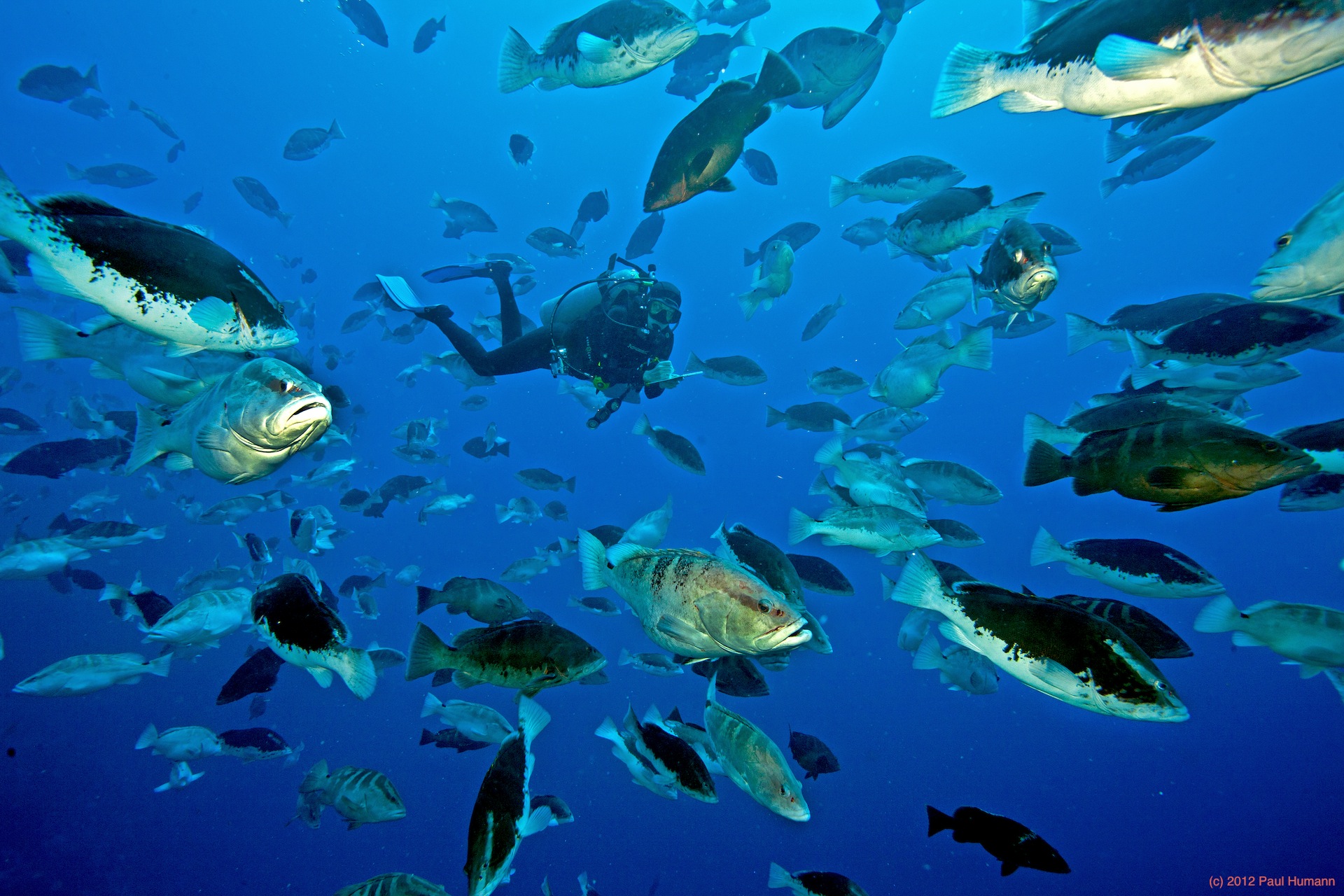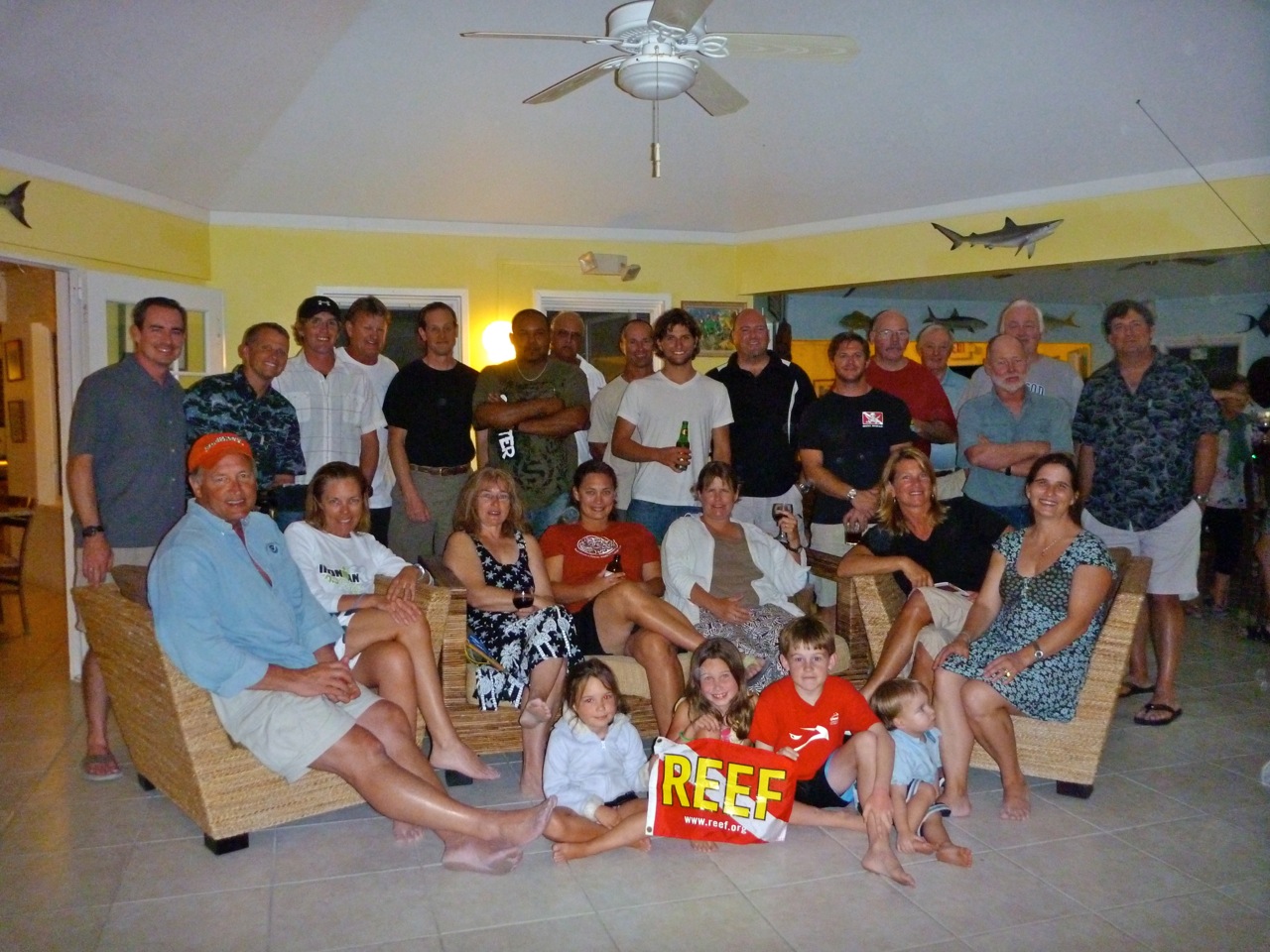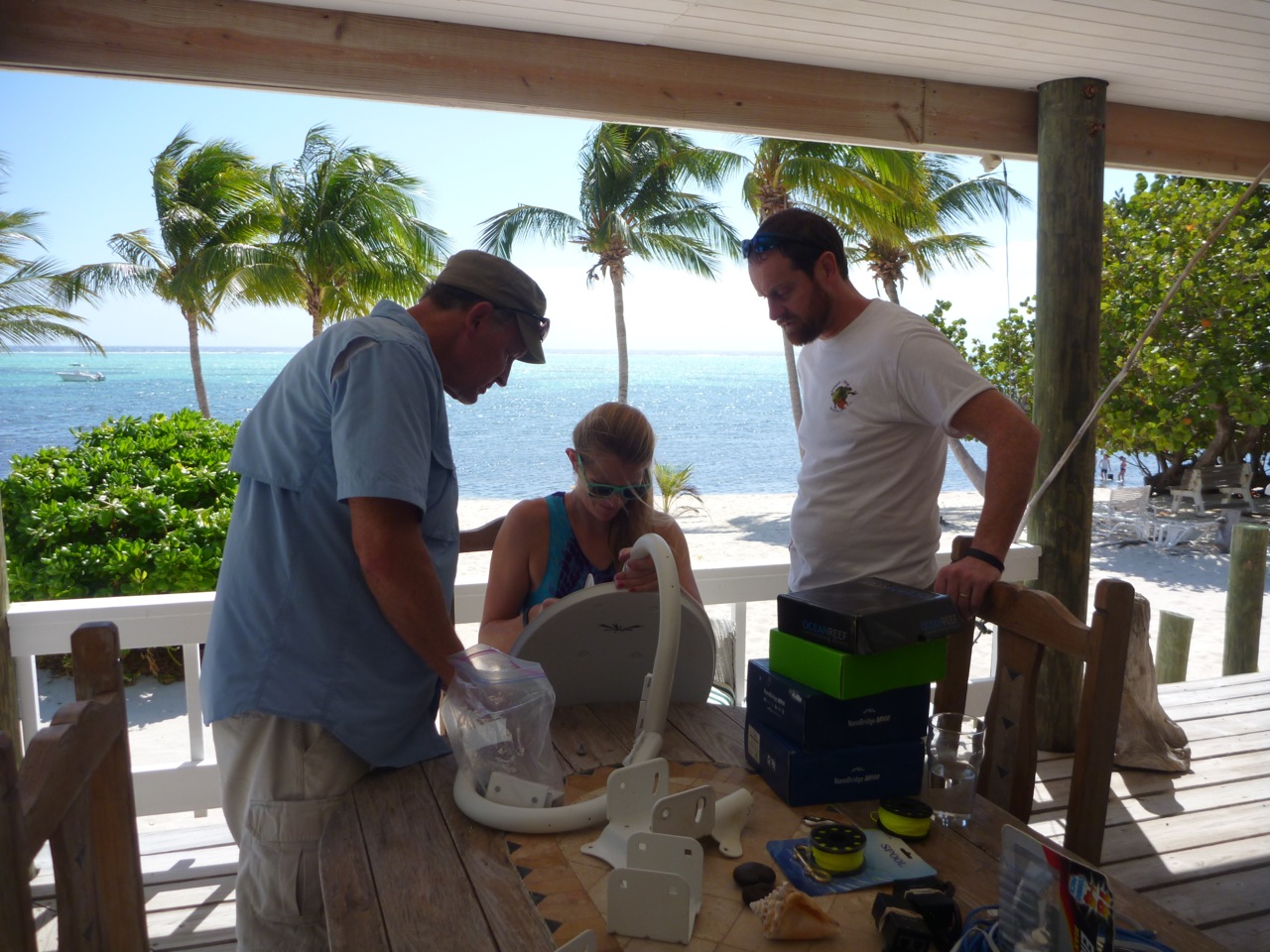News
Inspiring the Next Generation to Save the Iconic and Endangered Nassau Grouper
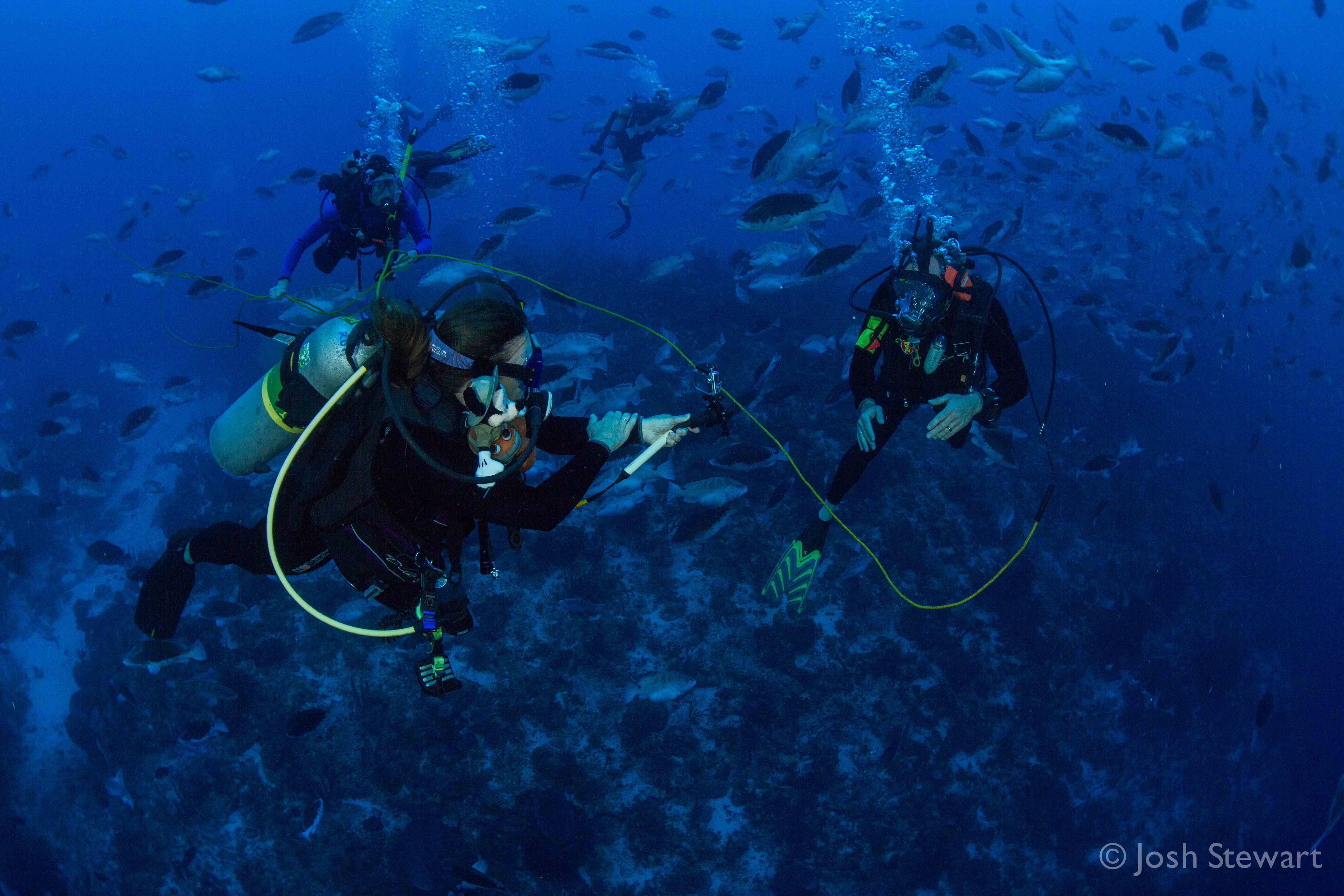
Live underwater webcasts from protected spawning site to local classrooms, and beyond, will visually teach important conservation lessons
As the winter full moon approaches, the Southern Cross Club on Little Cayman prepares for the annual arrival of the Grouper Moon Project team. Each year from late January to early February, scientists and volunteers of the Reef Environment Education Foundation (REEF) join staff from the Cayman Islands Department of the Environment (DOE) to document the last healthy, active and protected Nassau Grouper spawning site just off Little Cayman. The Southern Cross Club and others in the local community provide vital support to the team, recognizing that it takes an entire community to bring this historical and endangered species back from the brink of extinction.
In addition to documenting fish activity and population for valuable research data, the project also reaches out to local school children hoping to inspire them to join the conservation effort. It does this largely by streaming live video on the Internet from Little Cayman to local classrooms where children can see on a computer the work being done through the Grouper Moon Project. Two live webcasts are planned from underwater; one of them from the aggregation site where a scientist in scuba gear diving among the fish will show students what happens when Grouper spawn and why they are vulnerable at this time. He will also answer their questions about the mysterious and solitary fish that travels long distances to spawn at this site on Little Cayman. This year the webcasts are being streamed to classrooms in 10 schools on Grand Cayman, 3 schools on Cayman Brac, and for first time, the small school on Little Cayman.
“We’ve been expanding every year, adding more schools to the program because we get such good response,” says REEF educator Todd Bohannon, who with guidance from REEF scientists has developed the education curriculum. The webcasts lessons will be streamed from the aggregation site off the west coast of Little Cayman, from project headquarters at a house near the Southern Cross Club and from Bloody Bay Wall.
“The kids have an immediate connection to the lessons because it’s their history,” says Bohannon, who facilitates the webcasts between the scientists and the classrooms, fielding questions from the students. “They need to see the threat to the fish and these webcasts allow them to see it right in front of their eyes. We are giving them the tools they need to protect their environment and they are very enthusiastic, super smart and super excited.”
The hope is that by giving Caymanian kids a chance to see first hand what the scientists are doing to save the grouper, it will inspire them to continue the conservation work. Bohannon says the response from the children of Cayman Brac as been outstanding, and this year family evening events are planned.
“I can tell the Brac kids are talking to their families about the program because of their questions regarding fishing,” says Bohannon. “They get really excited, their reaction and comments are richer, and I like that.”
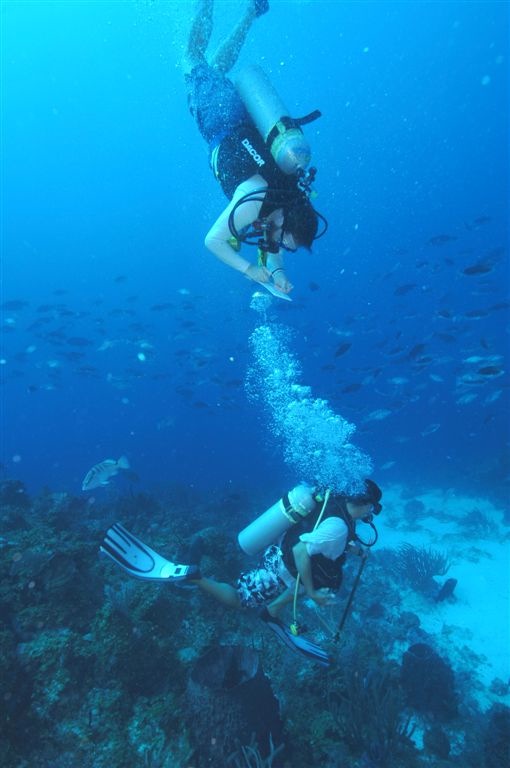 Although they’ve never seen the live feeds before, the students of the Little Cayman Education Service (LCES) School have always been aware of what happens on their island during the Grouper Moon.
Although they’ve never seen the live feeds before, the students of the Little Cayman Education Service (LCES) School have always been aware of what happens on their island during the Grouper Moon.
“They know what’s going on in Little Cayman when we come in and infiltrate the island!” says Bohannon. Last year Internet problems prevented a webcast in their classroom, so the Grouper Moon team made a personal visit to the classroom. “They loved it – it was great!”
Some of the live webcast lessons will be broadcasted from the porch at Peter Hillenbrand’s house near the Southern Cross Club. Hillenbrand, owner of the resort and a dedicated conservationist, is happy to have his house become “Grouper Moon central.” He enjoys being involved in the project and watching the marine scientists teach important lessons from his porch.
“The live broadcasts are one of the coolest learning tools I have ever seen,” he says. “It brings the Grouper Moon right into the class room, and there is nothing more important that educating our children about the world that surrounds them. There is not a better way to be amazed and learn other than being there yourself.”
Peter Hillenbrand and his team at the Southern Cross Club have been hosting the scientists and volunteers since the project began more than 12 years.
“We just take over the place – everyone is crashed out,” laughs a grateful Todd Bohannon, speaking for the entire Grouper Moon team. “This contribution is huge from a logistical point of view – Pete and his team always help out no matter what we need.”
“How do I prepare my house for the invasion? Ha! Well, I guess I try to make sure the sheets and towels are all clean, and my rum supply is abundant!” jokes Hillenbrand.
The good-natured camaraderie of the team enables and supports important conservation work being done. Nassau grouper has historically been one of the Caribbean’s most economically important fish, but intense harvesting during spawning aggregations has placed them on the endangered list. REEF is a volunteer organization and DOE has a limited research budget, so the project depends on volunteers, donations, fundraising and grants. Supporting the study are the Disney Worldwide Conservation Fund, Lenfest Ocean Program of the Pew Charitable Trusts, the NOAA International Coral Reef Conservation Program, the J. Edward Mahoney Foundation, and PADI Project AWARE. The Grouper Moon Project also relies on help from the Southern Cross Club and Peter Hillenbrand, the Little Cayman Beach Resort, Reef Divers, Brac Reef Resort, Divetech and others in the Cayman community.
Grouper Moon Project leaders say ultimately the salvation of the Nassau grouper depends on everyone who cares, doing their part to save the species – then carrying the message and passion to others. This year a few classrooms in the U.S. are participating in the live webcasts, and the team includes a couple of educators from the Bahamas, which helps the whole Caribbean.
“It’s vital for the success of the Grouper Moon Project to get the community involved,” says Todd Bohannon. “To have it last into perpetuity, you need to get the kids involved and you need to have the backing of the community.”
Each video session will begin at 11:45 am and continue for about an hour on designated dates. For more information and daily updates on the Grouper Moon Project visit www.groupereducation.edublogs.org.
Webcast Schedule:
Friday, Feb 6 at 11:45 am
Monday, Feb 9, 11:45 am
Tues, Feb 10, 11:45 am
Wed, Feb 11, 11:45 am (Backup Date)
(Cayman Time – CST)
About the Southern Cross Club
The casually sophisticated Southern Cross Club Fish & Dive Resort is Little Cayman’s original resort. It features 14 beachfront bungalows complete with a top-rated, professional in-house diving and fishing operation. A unique blend of rusticity and elegance the resort is often described as “Barefoot Luxury”. Guests can expect friendly and diligent service, delicious food, inviting rooms with breath-taking views and a comfortable dive boat ― a few of the things that bring them back year after year. Little Cayman is renowned for its breath-taking and pristine coral reefs and spectacular dive adventures. The resort’s beach-based location also provides flats fisherman with access to Bonefish and Permit just minutes away.
For reservations or more information:
Telephone: +1 (800) 899-CLUB (2582)
E-mail info@southerncrossclub.com
Website: www.southerncrossclub.com
Facebook: www.facebook/SouthernCrossClub
Gear News
Introducing the TR-80, IR-50 and CS-30 Regulators from DYNAMICNORD

Whether you are a beginner or a professional diver – with the three new main regulators from DYNAMICNORD, everyone will find their favourite regulator. They all look super stylish.
Excellent performance with the TR-80
Quality and performance are the be-all and end-all for regulators. It is not for nothing that the TR stands for Tec Reg. The innovative design of the TR-80 guarantees absolute reliability – even in ice-cold waters.

Perfect breathing effort at 0.8 J/l / certified for diving in waters below 10 degrees / structural design made of solid brass for best cold protection / membrane-compensated design with dry seal of the first stage / reduced exhalation effort thanks to optimized exhalation membrane and bubble deflector / adjustable Venturi (dive/predive) and adjustment knob for individual inhalation comfort / innovative design of the front cover prevents free-flow in strong currents or when diving with scooters / design made of sandblasted brass, matt chrome finish / 2 HP and 4 LP outlets / mouthpiece made of high-quality, anti-allergic silicone for maximum comfort.


Amazing underwater adventures with the IR-50
The IR-50 is the top regulator for advanced and experienced divers. Natural breathing is the essence of this regulator.

Ideal breathing effort at 0.8 J/l /certified for diving in waters below 10 degrees / compensated membrane / adjustable venturi (dive/predive) and adjustment knob for individual inhalation comfort/ outlet valve and deflector for minimum exhalation effort and reduction of bubbles on the face / design made of sandblasted brass, matt chrome finish / 2 HP and 4 NP outlets / mouthpiece made of high-quality, anti-allergic silicone for maximum comfort.


The Workhorse – our CS-30
For diving centres and diving beginners – the workhorse stands for strong construction, reliability and robustness. Perfect for your training.

Optimal breathing effort at 0.8 J/l /recommended for diving in waters above 10 degrees / non-compensated piston / adjustable venturi (dive/predive) / outlet valve and deflector for minimum exhalation effort and reduction of bubbles on the face / design made of sandblasted brass, matt chrome finish / 1 HP and 3 NP outlets / mouthpiece made of high-quality, anti-allergic silicone for maximum comfort.


Octopus OP-30
The OP-30 is the ideal addition to all DYNAMICNORD regulators. It is identical in construction to the CS-30.

The TR-80, IR-50, CS-30 (DIN & INT) regulators and the Octopus OP-30 are available from DYNAMICNORD dealers and in the online store.
DYNAMICNORD – Your Outdoor Companion.
Marine Life & Conservation
Paul Watson Released as Denmark Blocks Japan’s Extradition Bid

Renowned anti-whaling activist Paul Watson has been released from custody in Greenland after spending five months in detention. Denmark’s Justice Ministry rejected Japan’s request for his extradition, citing insufficient guarantees that his time already served in custody would be credited against any potential sentence.
The 74-year-old Canadian-American was arrested on July 21 in Nuuk, Greenland’s capital, when his ship docked to refuel. His arrest was based on a 2012 Japanese warrant related to a 2010 encounter in Antarctic waters. Japan alleged Watson obstructed operations and caused damage to a whaling research ship during efforts to disrupt illegal whaling. Watson has consistently denied these claims, maintaining his commitment to marine conservation.
Denmark, which oversees extradition matters for Greenland, concluded that while the legal conditions for extradition were met, the lack of assurances from Japan regarding time-served credit made extradition untenable.
In a video shared by his foundation, Watson expressed gratitude and relief, saying, “After five months, it’s good to be out… and good to know they’re not sending me to Japan.” He added that the most difficult part of his time in custody was being separated from his two young sons.
Watson is a pioneering figure in marine conservation, known for founding the Captain Paul Watson Foundation in 2022 after decades of activism with the Sea Shepherd Conservation Society. His bold efforts to defend marine life have earned him widespread support, including from celebrities and conservationists. His work has also been featured in the acclaimed reality TV series Whale Wars.
Watson’s lawyer, Jonas Christoffersen, praised the decision, stating, “We are happy and relieved that Paul Watson is now free.” He added that Watson is eager to reunite with his family and continue his vital work.
The arrest occurred while Watson’s vessel, the M/Y John Paul DeJoria, was en route to the North Pacific with a team of 26 volunteers to intercept a Japanese whaling ship. His foundation described the arrest as politically motivated and emphasized that Watson’s actions were focused on ending illegal whaling practices.
Japan resumed commercial whaling in 2019 after leaving the International Whaling Commission, asserting that whale meat is a cultural tradition. Conservationists, however, continue to challenge these practices, highlighting their impact on marine ecosystems.
Despite the challenges, Watson remains steadfast in his mission to protect marine life and bring attention to whaling practices. His dedication to ocean conservation has made him a globally respected advocate for the environment.
-

 News2 months ago
News2 months agoIconic SS United States to become the World’s Largest Artificial Reef
-

 News3 months ago
News3 months agoBook Review – 52 Assignments: Underwater Photography
-

 Gear News3 months ago
Gear News3 months agoDYNAMICNORD – New German diving brand enters the British market
-

 News3 months ago
News3 months agoExploring Cenote El Pit: A Diver’s Dream
-

 Gear News3 months ago
Gear News3 months agoTry BARE drysuits (and maybe even win one!) this Friday with Sea & Sea at North West Dive Fest
-

 Marine Life & Conservation3 months ago
Marine Life & Conservation3 months agoBook Review: Coral Triangle Cameos
-

 Blogs2 months ago
Blogs2 months agoDive the Egyptian Red Sea this Autumn with Regaldive
-

 News3 months ago
News3 months ago2024 Ocean Art Underwater Photo Competition Announced


